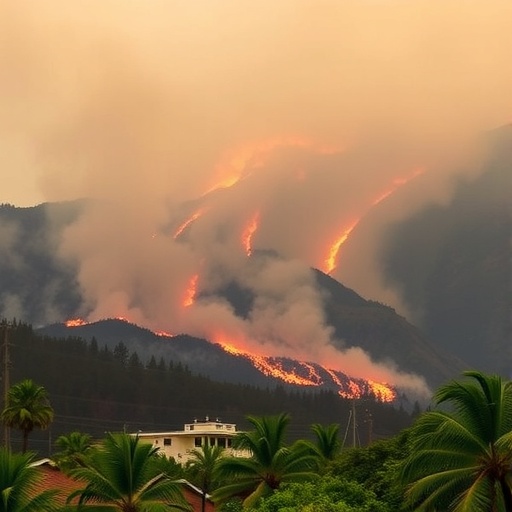New Research Reveals Alarming Spike in Suicide and Overdose Deaths Following 2023 Maui Wildfires
In the wake of the catastrophic wildfires that swept through Maui in August 2023, a groundbreaking study has surfaced, demonstrating a significant escalation in suicide and drug overdose fatalities across Hawaii. This research, recently published in the esteemed Journal of the American Medical Association (JAMA), sets a critical precedent by establishing the acute mental health consequences of wildfire disasters with a level of immediacy not previously documented.
Led by Dean Alex Ortega of the Thompson School of Social Work and Public Health, alongside Chair Keawe‘aimoku Kaholokula of the Department of Native Hawaiian Health at the University of Hawaiʻi at Mānoa, the investigative team collaborated with Jonathan Purtle, an associate professor at New York University’s School of Global Public Health. Together, they leveraged comprehensive mortality data dating from 2014 to 2023 to conduct a temporal analysis across Hawaii’s counties, focusing specifically on rates of suicide and drug overdose deaths.
The analytical framework employed entailed a comparative approach to death trends prior to, during, and subsequent to the devastating wildfire events. The findings reveal a staggering 46% statewide increase in these causes of death during August 2023. More strikingly, Maui exhibited profound vulnerability—suicide and overdose deaths nearly doubled, rising by 97% compared to baseline periods. When isolating suicide cases alone, Maui’s rates soared by an extraordinary 182% relative to other islands within the archipelago.
These statistical outcomes illuminate the profound psychological and behavioral fallout that often accompanies natural disasters but have rarely been quantified with such immediacy or specificity. The researchers underscore that this rapid surge in mortality rates contrasts markedly with prior studies where increased suicide rates appeared months after disaster exposure, indicating a unique and urgent public health challenge for wildfire-stricken regions.
The underlying mechanisms for these heightened deaths are multifactorial. Direct exposure to the wildfires, as well as the intensive stress related to displacement and concern for missing loved ones, are hypothesized contributors. Notably, migration patterns — with many residents fleeing to other islands — may have inadvertently influenced the rise in suicide and drug overdose deaths statewide, further complicating the epidemiological landscape.
Complementing this mortality data, earlier research led by the same University of Hawaiʻi group revealed a 41% increase in calls to the 988 Lifeline crisis phone service following the Lahaina wildfires. This surge in mental health-related emergencies exposed well-documented gaps in Hawaiʻi’s behavioral health infrastructure and emphasized an urgent need for strengthened support mechanisms.
Crucially, the study advances a clarion call for comprehensive inclusion of behavioral health strategies in disaster preparedness and response plans. Proyecto leaders highlight that interventions must transcend physical reconstruction efforts, addressing the psychological, cultural, and emotional dimensions of community recovery. Kaholokula explicitly states the necessity to tackle feelings of despair, cultural dislocation, and stigma surrounding mental health, advocating for policies and practices oriented toward suicide prevention and substance abuse treatment.
The research is situated within a larger five-year NIH-funded initiative, the Maui LOA (Learnings to Overcome Adversities) Project, which seeks to elucidate how large-scale disasters influence community resilience, healthcare systems, and emergency response capabilities. By focusing on vulnerable populations, these efforts aim to fortify health system infrastructure and enhance access to critical care amid escalating climate-related disasters.
Technical examination of the death records employed advanced data and statistical analyses sourced from the Centers for Disease Control and Prevention (CDC), ensuring robustness and credibility in the assessment of temporal suicide and overdose trends. While the currently available dataset only extends through August 2023, the team plans continued surveillance with 2024 mortality data to analyze longitudinal impacts as survivors and communities navigate the prolonged aftermath of the fires.
Ortega’s remarks underscore a broader global health emphasis: as wildfires and other climate disasters intensify in frequency and severity due to ongoing climate change, public health infrastructure must be proactively adapted to address not only physical but psychological repercussions. This study adds an urgent voice to calls for integrated mental health services embedded within disaster response frameworks.
From a clinical psychology standpoint, these findings also highlight the critical need to attend to behavioral responses post-trauma that can precipitate suicide and substance misuse, both of which carry delayed and immediate risks to life. Health systems and policymakers should prioritize funding and implementation of rapid mental health interventions, crisis counseling, and substance abuse prevention programs tailored to disaster-impacted populations.
The unprecedented immediacy and magnitude of suicide and overdose increases observed in Maui raise disturbing questions about how well current disaster response models account for mental health. The research community must now focus on refining early detection methods for behavioral health crises and integrating these insights into emergency response training and planning.
Future research inspired by these findings will be essential in dissecting the psychosocial pathways linking wildfire exposure to mortality. Moreover, the data advocate for culturally sensitive approaches rooted in the unique social, economic, and historical contexts of Native Hawaiian communities, whose well-being is disproportionately affected during environmental catastrophes.
In sum, this seminal study provides a sobering lens into the collision of climate disasters and mental health crises, urging an urgent reevaluation of public health preparedness as the climate crisis accelerates. By unveiling the stark increases in death by suicide and drug overdose in the immediate aftermath of Maui’s wildfires, it opens a critical window for intervention, policy innovation, and community support strategies aimed at preventing avoidable loss of life in a warming world.
Subject of Research: People
Article Title: Increases in Suicides and Overdoses During the 2023 Wildfires in Maui, Hawaiʻi
News Publication Date: 6-Aug-2025
Web References:
References:
- CDC death records analysis (2014-2023)
- 988 Lifeline call data post-Lahaina wildfire
Keywords:
Public health, Suicide, Drug abuse, Alcohol abuse, Climate change adaptation, Mental health




